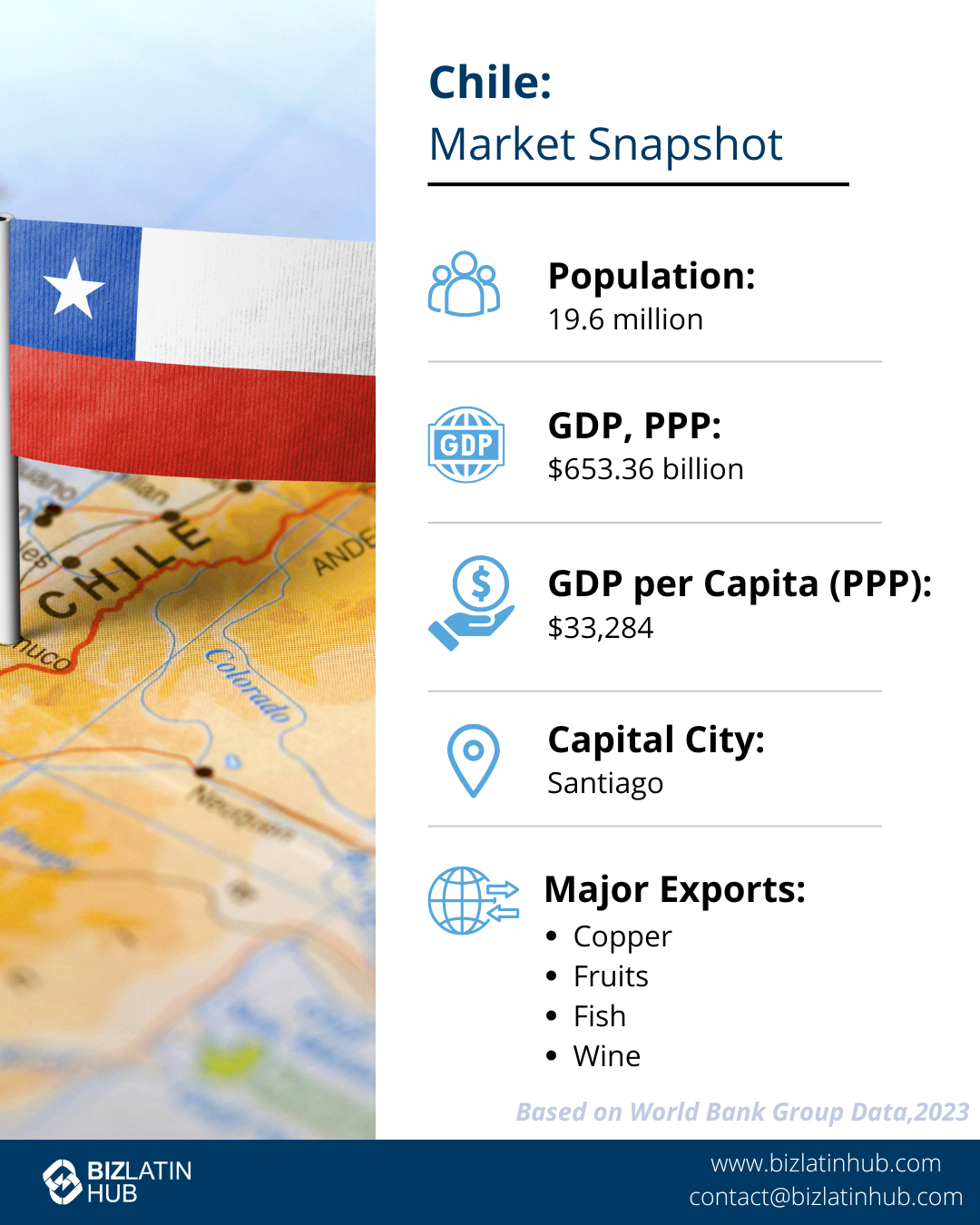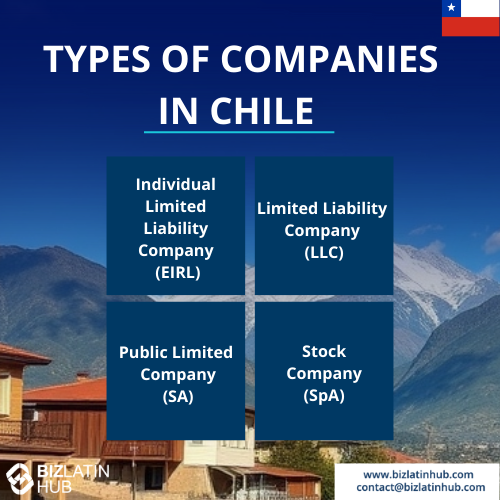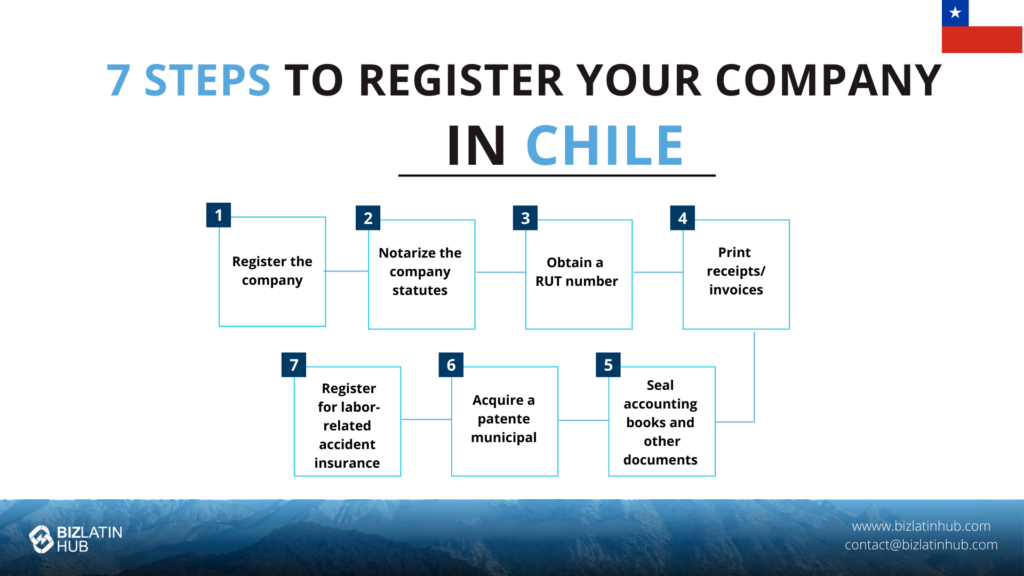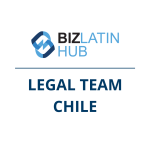
Company Formation in Chile: a 7 step guide
Understanding company formation in Chile is essential for foreign investors to thrive in this booming market. By following our guide, it will make your journey doing business in Chile that much easier, assisting with your research and preparation. Biz Latin Hub offers unparalleled local knowledge and a comprehensive suite of back-office services, allowing you to focus on growing your business and making Chile part of your success.
Key Takeaways On Company Formation in Chile
| Is Foreign Ownership Permitted in Chile? | Business can be 100% foreign-owned by either legal persons (legal entities) or natural persons (individuals). |
| Steps for Company Formation in Chile: | Step 1 – Register the company. Step 2 – Notarize the company statutes. Step 3 – Obtain a RUT number. Step 4 – Print receipts/invoices. Step 5 – Seal accounting books and other documents. Step 6 – Acquire a patente municipal. Step 7 – Register for labor-related accident insurance. |
| What Are The Common Entity Types in Chile? | Individual Limited Liability Company (EIRL). Limited Liability Company (LLC). Corporation (SA). Stock Company (SpA). |
| Why Setup a Business in Chile? | Chile has made the online process to register a business in Chile extremely easy, meaning you can do the whole process outside the country. |
7 Steps For Company Formation in Chile
You must understand each step of the company formation process before you begin. Below is a detailed step-by-step guide to help familiarize yourself with the system in Chile.
It takes approximately 6 to 8 weeks to complete the process of company formation in Chile once you have all of the required documents. Here are the 7 steps you will need to follow:
- Step 1 – Register the company.
- Step 2 – Notarize the company statutes.
- Step 3 – Obtain a RUT number.
- Step 4 – Print receipts/invoices.
- Step 5 – Seal accounting books and other documents.
- Step 6 – Acquire a patente municipal.
- Step 7 – Register for labor-related accident insurance.
Step 1 – Register the company and obtain the authentication number
Apply for the authentication number at the Chilean Chamber of Commerce or the corresponding regional office. This is a unique identifier for the company and is required for all business activities.
Step 2 – Notarize the company statutes and digitally signed by the notary
The company statutes outline the structure and regulations of the company. It is essential to have these notarized by a public notary in Chile, and the document should be digitally signed to ensure its authenticity.
Step 3 – Obtain a RUT number by registering with the Internal Revenue Service (SII in Spanish)
The RUT (Rol Único Tributario) number is the company’s tax identification number. This number is necessary for all tax-related activities in Chile, including paying taxes, issuing invoices, and importing/exporting goods.
Step 4 – Print receipts/invoices at an authorized printing company
Receipts and invoices must be printed at a certified printing company in Chile. These documents are used for accounting and tax purposes and must comply with Chilean regulations.
Step 5 – Seal accounting books and other documents with the Chilean Tax authority
After registering the company with the Chilean Tax Authority (Servicio de Impuestos Internos), the accounting books and other financial documents must be stamped or sealed by the authority.
Step 6 – Acquire a patente municipal working license from the municipality
The patente municipal is a business license issued by the local municipality where the company is located. This license authorizes the company to operate and is necessary for many business activities.
Step 7 – Register for labor-related accident insurance
All employers in Chile are required to provide accident insurance for their employees. This insurance covers medical expenses and lost wages in the event of a work-related injury or illness.
Important Note: If the company has foreign shareholders, then a Power of Attorney (POA), apostille process, and translation of documents may be required.

Starting a Business in Chile: 4 Types of Chilean Companies
Company formation in Chile is a multi-step process, and one of the initial and most crucial decisions you’ll make is selecting the correct types of company in Chile. The type of company you choose will have significant implications on aspects such as liability, taxation, and administrative requirements. In Chile, there are several types of companies to choose from, each with its own set of characteristics and requirements.
Here are the 4 types of Chilean companies:
- Individual Limited Liability Company (EIRL).
- Limited Liability Company (LLC).
- Corporation (SA).
- Stock Company (SpA).
Below, we will provide an overview of the most common types of company formation in Chile to help you understand the options available and make an informed decision for your business.

1. Individual Limited Liability Company (EIRL)
A Individual Limited Liability Company (Empresa Individual de Responsabilidad Limitada EIRL) is a good choice when you are the sole business owner. An EIRL is a legal entity that can conduct most business activities, except for a select few reserved for corporations.
As the owner, you are only liable for the amount you invest in the company, and the company is liable for all its assets. The company name should reflect the goods or services it offers or incorporate the owner’s name.
2. Limited Liability Company (LLC)
You can form an LLC with anything between 2 to 50 shareholders, and the company name must illustrate the goods or services it provides or include the name of one or more partners. There is no minimum capital requirement, and the partners can decide on the company’s activities and choose its management. Forming an LLC is a popular option.
3. Public Limited Company (SA)
A public limited company (Sociedad Anónima or SA) is another option for company formation. A corporation requires a group of shareholders that establish a common fund and a board of directors that administer the company and make decisions via a majority vote.
Each shareholder is liable to the extent of their capital contribution. The starting capital of a corporation must be fully subscribed and paid within three years. There are two types of corporations: public corporations and closed corporations.
4. Stock Company (SpA)
A stock company (Sociedad por Acciones or SpA) adhere to the same regulations as closed corporations, and their management is handled in a nearly identical manner. Stock companies can be formed by one or more individuals and their capital participation is represented by shares. In our experience, this is one of the easiest companies to start and always a strong recommendation.
To begin company formation in Chile, it is vital to have an excellent understanding of the various types of legal entities and choose the one that best reflects your business.
What are the Minimum Requirements to Incorporate a SpA in Chile?
The minimum requirements to incorporate a SpA in Chile are:
- A name for your legal entity.
- (1) shareholder, which can be either a natural person (individual) or legal person (entity).
- Appoint a legal representative within the bylaws of the company.
- Register a fiscal address which must be within the country and is used for official correspondence.
These are the minimum requirements to incorporate a SpA in Chile. It’s important to note that the process can involve other steps and documents, depending on the specific circumstances of your business and the type of company you’re setting up. It’s highly recommended to seek professional legal and business advice when starting a company in Chile to ensure compliance with all regulations and to make the process as smooth as possible.
Important Recommendations(s):
The founding shareholders do not need to physically travel to the country as company formation in Chile can be completed via a power of attorney.
Although a company can be incorporated with a zero minimum share capital, we would recommend against this as monies must be deposited to activate the company bank account.
How Do I Set Up a Company in Chile?
It is vital that you have the necessary documents and information organized before you start the process of setting up your company in Chile. Below we have highlighted the key resources you need to present.
To proceed with incorporating a SpA in Chile, you will need to provide the following:
- A name for your legal entity.
- Shareholder identification document.
- The business activities, corporate purpose, and primary operations.
- Minimum initial capital to be registered.
Important Tip: We always recommend having a preferred legal name and two alternatives in case the primary legal name is unavailable.

FAQs on company formation in Chile
Answers to some of the most common questions we get asked by our clients.
1. Can a foreigner own a business in Chile?
Yes, a business can be 100% foreign-owned by either legal persons (legal entities) or natural persons (individuals).
2. What is the Chile Company Tax ID (RUT)?
The Chile Company Tax ID is issued by the SSI and known as RUT (Registro Único Tributario), which translates in English to Single Tax Registration, a unique identification number for tax purposes in Chile.
3. How long does it take to register a company in Chile?
It takes 6 to 8 weeks to register and set up an operating company in Chile, contingent upon the timely submission of all necessary documents.
4. What does a SpA company name mean in Chile?
The SpA in a company name in Chile refers to a Sociedad por Acciones, which is similar to a joint stock company. This corporate entity allows for shares to be easily bought and sold. One or more individuals or legal entities can establish the structure, which offers flexibility in terms of capital management. Due to its adaptability and capacity for a variety of investments and shareholders, businesses and entrepreneurs frequently choose it.
5. What does an LTDA company name mean in Chile?
LTDA in a company name in Chile refers to a Sociedad de Responsabilidad Limitada, which is similar to a Limited Liability Company. Partners’ liability is limited to their contributions to the company’s capital. In an LTDA, partners are not personally responsible for the company’s debts beyond their investment, providing a level of protection for individual assets. Small to medium-sized businesses frequently use it in Chile because it combines elements of partnership and corporate structures, providing flexibility and legal protections.
6. What entity types offer Limited Liability in Chile?
The Sociedad por Acciones (SpA) and Sociedad de Responsabilidad Limitada (SRL) both provide limited liability protections to their owners in Chile.
Differences Between a SpA and an LTDA in Chile
| Aspect | Sociedad Anónima (SpA) | Limited Liability Company (LTDA) |
|---|---|---|
| A. Number of Shareholders | One shareholder. | One or more shareholders. |
| B. Administration | Entrusted to one or more individuals, legal entities, or a Board of Directors. | Entrusted to one or more shareholders. |
| C. Responsibility of Shareholders | Shareholders are liable only up to the amount of their capital contributions. | Shareholders are liable only up to the amount of their capital contributions. |
| D. Social Capital | Divided into shares. | Percentage of rights over the company with no specific allocation to certain assets. |
| E. Changes of Ownership | Any shareholder can unilaterally sell shares. | Existing owners need to approve the entry of new owners. |
Why Choose to Incorporate a Company in Chile?
Though smaller in size compared to its neighbors, Chile is currently drawing levels of Foreign Direct Investment (FDI) similar to Mexico. In recent years, Chile has made it extremely convenient to start a business, with new laws allowing for online company formation in Chile within a day. However, corporate laws may differ from those in other countries. Therefore, it’s best to seek guidance from a local legal expert before you start a company in the country.
Chile’s impressive year-on-year GDP growth of 1.9% in 2023 is a testament to its strong legal system, macroeconomic stability, abundant natural resources, and high-quality infrastructure. With a total GDP of USD$344 billion and a GDP (PPP) per capita surpassing the regional average, at over USD$29,000, Chile has grown impressively.
How can Biz Latin Hub help with company formation in Chile?
At Biz Latin Hub, our multilingual team of company formation specialists has extensive experience in supporting foreign executives when starting a business in Chile. We offer a complete set of services for your business needs, such as legal, accounting, and recruitment support. You can rely on us as your main contact for entering and doing business in Chile or any of the other 17 markets in Latin America and the Caribbean where we operate.
Contact us now for personalized assistance or a free quote on company formation in Chile.
Learn more about our team and expert authors.





